- Clone
- 927 (See other available formats)
- Regulatory Status
- RUO
- Other Names
- BST2, tetherin, HM1.2 antigen, bone marrow stromal antigen 2, PDCA-1
- Isotype
- Rat IgG2b, κ
- Ave. Rating
- Submit a Review
- Product Citations
- publications
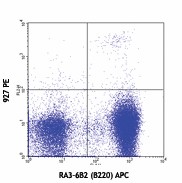
-

C57BL/6 splenocytes stained with RA3-6B2 (B220) APC and 927 PE
| Cat # | Size | Price | Quantity Check Availability | Save | ||
|---|---|---|---|---|---|---|
| 127009 | 25 µg | $98 | ||||
| 127010 | 100 µg | $335 | ||||
CD317, known as BST2, tetherin, HM1.2 antigen, bone marrow stromal antigen 2, or PDCA-1, is type II transmembrane glycoprotein with a molecular mass of 29-33 kD. It is predominantly expressed on Type I IFN-producing cells (IPCs) in naïve mice, but is up-regulated on most cell types following stimulation with type I IFNs and IFN-gamma. It is highly expressed on terminally differentiated normal plasmacytoid dendritic cells and some tumor cells, such as multiple myeloma, renal cell carcinoma, and melanoma cells. BST2 is a recently identified, IFN-induced cellular response factor that blocks release of HIV-1 and other retroviruses from infected cells. BST2 has been found to be the natural ligand of ILT7 in human model.
Product DetailsProduct Details
- Verified Reactivity
- Mouse
- Antibody Type
- Monoclonal
- Host Species
- Rat
- Immunogen
- Mouse plasmacytoid dendritic cells (DCs)
- Formulation
- Phosphate-buffered solution, pH 7.2, containing 0.09% sodium azide.
- Preparation
- The antibody was purified by affinity chromatography, and conjugated with PE under optimal conditions.
- Concentration
- 0.2 mg/ml
- Storage & Handling
- The antibody solution should be stored undiluted between 2°C and 8°C, and protected from prolonged exposure to light. Do not freeze.
- Application
-
FC - Quality tested
- Recommended Usage
-
Each lot of this antibody is quality control tested by immunofluorescent staining with flow cytometric analysis. For flow cytometric staining, the suggested use of this reagent is ≤0.25 µg per million cells in 100 µl volume. It is recommended that the reagent be titrated for optimal performance for each application.
- Excitation Laser
-
Blue Laser (488 nm)
Green Laser (532 nm)/Yellow-Green Laser (561 nm)
- Application Notes
-
Additional reported applications (for the relevant formats) include: immunofluorescence microscopy, functional assay2, and depletion3,4. The Ultra-LEAF™ purified antibody (Endotoxin <0.01 EU/µg, Azide-Free, 0.2 µm filtered) is recommended for functional assays.
-
Application References
(PubMed link indicates BioLegend citation) -
- Blasius AL, et al. 2006. J. Immunol. 177:3260.
- Schliemann C, et al. 2010. Blood 115:736. (FA, IF)
- Rajagopal D, et al. 2010. Blood 115:1949. (Depletion)
- Moniz RJ, et al. 2010. FEMS Immunol. Med. Microbiol. 58:397. (Depletion)
- Chen YL, et al. 2013. J Exp Med. 210:2515. PubMed
- Product Citations
-
- RRID
-
AB_1953284 (BioLegend Cat. No. 127009)
AB_1953285 (BioLegend Cat. No. 127010)
Antigen Details
- Structure
- Type II transmembrane glycoprotein with a molecular mass of 29-33 kD.
- Distribution
-
Expressed on type I IFN-producing cells, plasmacytoid dendritic cells, and neoplastic B cells, such as multiple myeloma.
- Function
- Recently identified antiviral protein that blocks the release of nascent retrovirus or other particles from infected cells.
- Cell Type
- Dendritic cells
- Biology Area
- Costimulatory Molecules, Immunology, Innate Immunity
- Molecular Family
- CD Molecules
- Antigen References
-
1. Douglas JL. et al. 2009. J Virol. 83(16):7931
2. Cao W et al. 2009. J. Exp. Med. 206(7):1603
3. Neil SJ. et al. 2008. Nature 451:425 - Gene ID
- 69550 View all products for this Gene ID
- UniProt
- View information about CD317 on UniProt.org
Related FAQs
- What type of PE do you use in your conjugates?
- We use R-PE in our conjugates.
Other Formats
View All CD317 Reagents Request Custom ConjugationCustomers Also Purchased
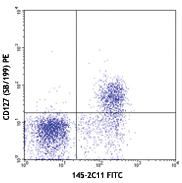


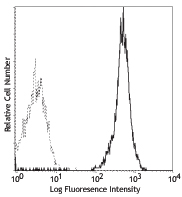
Compare Data Across All Formats
This data display is provided for general comparisons between formats.
Your actual data may vary due to variations in samples, target cells, instruments and their settings, staining conditions, and other factors.
If you need assistance with selecting the best format contact our expert technical support team.
-
Purified anti-mouse CD317 (BST2, PDCA-1)
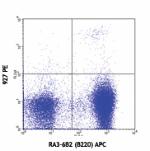
C57BL/6 splenocytes stained with RA3-6B2 (B220) APC and 927 ... -
PE anti-mouse CD317 (BST2, PDCA-1)

C57BL/6 splenocytes stained with RA3-6B2 (B220) APC and 927 ... -
Alexa Fluor® 488 anti-mouse CD317 (BST2, PDCA-1)
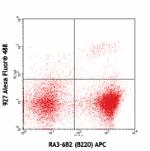
C57BL/6 splenocytes stained with RA3-6B2 (B220) APC and 927... -
Alexa Fluor® 647 anti-mouse CD317 (BST2, PDCA-1)
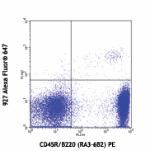
SJL mouse splenocytes stained with 927 Alexa Fluor® 647 and... 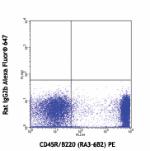
SJL mouse splenocytes stained with rat IgG2b isotype control... -
APC anti-mouse CD317 (BST2, PDCA-1)
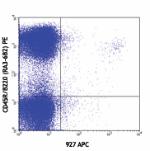
C57BL/6 splenocytes stained with 927 APC and CD45R/B220 (RA3... 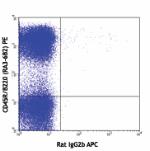
C57BL/6 splenocytes stained with rat IgG2b APC isotype contr... -
Pacific Blue™ anti-mouse CD317 (BST2, PDCA-1)
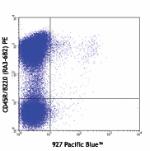
C57BL/6 splenocytes stained with 927 Pacific Blue™ and CD45R... 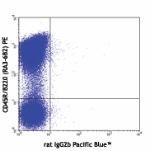
C57BL/6 splenocytes stained with rat IgG2b Pacific Blue™ iso... -
Biotin anti-mouse CD317 (BST2, PDCA-1)
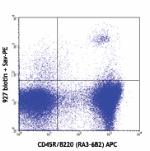
C57BL/6 splenocytes stained with CD45R/B220 (RA3-6B2) APC an... 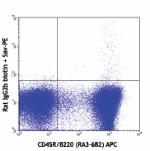
C57BL/6 splenocytes stained with CD45R/B220 (RA3-6B2) APC an... -
FITC anti-mouse CD317 (BST2, PDCA-1)
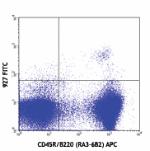
C57BL/6 splenocytes stained with 927 FITC and CD45R/B220 (RA... 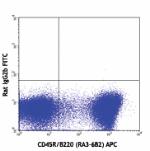
C57BL/6 splenocytes stained with rat IgG2b FITC isotype cont... -
Brilliant Violet 650™ anti-mouse CD317 (BST2, PDCA-1)
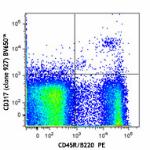
C57BL/6 splenocytes were stained with CD45R/B220 PE and CD31... 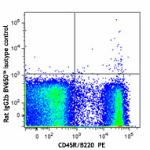
-
PerCP/Cyanine5.5 anti-mouse CD317 (BST2, PDCA-1)

C57BL/6 mouse splenocytes were stained with CD45R/B220 APC a... -
Brilliant Violet 421™ anti-mouse CD317 (BST2, PDCA-1)
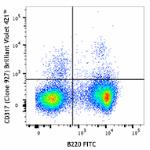
C57BL/6 splenocytes stained with anti-B220 FITC and 927 Bril... 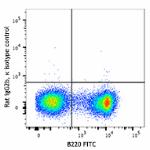
-
Brilliant Violet 605™ anti-mouse CD317 (BST2, PDCA-1)
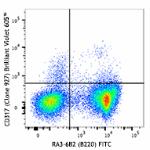
C57BL/6 splenocytes stained with RA3-6B2 (B220) FITC and 927... 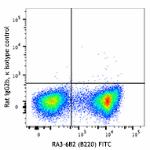
-
TotalSeq™-A0811 anti-mouse CD317 (BST2, PDCA-1)
-
Ultra-LEAF™ Purified anti-mouse CD317 (BST2, PDCA-1)

C57BL/6 splenocytes stained with RA3-6B2 (B220) APC and 927 ... -
TotalSeq™-C0811 anti-mouse CD317 (BST2, PDCA-1)
-
Alexa Fluor® 700 anti-mouse CD317 (BST2, PDCA-1)

C57BL/6 splenocytes stained with B220 FITC and CD317 (BST2, ... -
Brilliant Violet 711™ anti-mouse CD317 (BST2, PDCA-1)

C57BL/6 splenocytes stained with CD45R/B220 FITC and CD317 (... -
TotalSeq™-B0811 anti-mouse CD317 (BST2, PDCA-1) Antibody
-
Spark UV™ 387 anti-mouse CD317 (BST2, PDCA-1)

C57BL/6 mouse splenocytes were stained with anti-mouse CD45R... -
PerCP/Fire™ 806 anti-mouse CD317 (BST2, PDCA-1)

C57BL/6 mouse splenocytes were stained with anti-mouse CD45R... -
Spark PLUS UV395™ anti-mouse CD317 (BST2, PDCA-1)

C57BL/6 mouse splenocytes were stained with anti-mouse CD45R...
 Login/Register
Login/Register 













Follow Us